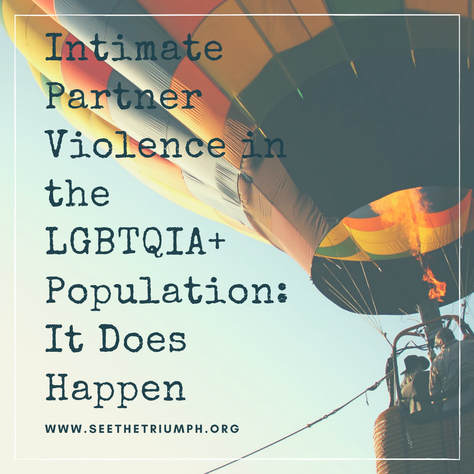|
By Lauren Boyette, See the Triumph Guest Blogger
With the focus on females in heterosexual relationships comprising the majority of survivors of intimate partner violence, it is easy to put same-sex IPV survivors in the back of the mind. So many people don’t even think about the LGBTQIA+ community when they are thinking about domestic abuse. As same-sex marriage is in its national infancy, it’s easy to understand that IPV in the LGBTQIA+ community hasn’t gotten much “radio-time” in national media. But it does happen. According to statistics, 44% of lesbian women and 26% of gay men have experienced rape, physical abuse, and/or stalking behavior from a partner within their life (www.domestic shelters.org). That’s almost half of lesbian women and almost a third of gay men. Those are huge numbers! But even with numbers that large, we aren’t hearing much about same-sex domestic violence in the media. Individuals within this community are already experiencing marginalization because of their sexual orientation; imagine how an individual experiencing domestic violence in a same-sex relationship must feel when they are excluded from the majority of the reported information on this issue. When looking at transgender individuals and IPV the numbers are even more staggering. The Williams Institute reports that somewhere between 31.1% and 50% of transgender individuals have experienced intimate partner violence in their lifetime. This number spans such a wide range because of underreporting by this community, as well as misrepresentation of reporting due to legal definitions of intimate partner violence due to legal/expressed gender. While individuals in same-sex relationships have their own unique barriers, transgender individuals experiencing IPV have compounded legal issues surrounding their gender along with the definition of domestic abuse. For all individuals in LGBTQIA+ relationships that may be the victims of IPV, the availability of resources for this community may also be a barrier to seeking assistance and reporting their abuse. There needs to be an ongoing dialogue about how we can include all survivors of IPV in the effort to help survivors and work through the issue of domestic abuse. We need to make sure that LGBTQIA+ survivors know that resources are available, and if they aren’t available in our local communities, we need to take steps towards inclusivity and availability. For all survivors, we see you. For IPV survivors in the LGBTQIA+ community, you are not alone. Resources:
Comments are closed.
|
Archives
July 2024
CategoriesAll About Intimate Partner Violence About Intimate Partner Violence Advocacy Ambassadors Children Churches College Campuses Cultural Issues Domestic Violence Awareness Month Financial Recovery How To Help A Friend Human Rights Human-rights Immigrants International Media Overcoming Past Abuse Overcoming-past-abuse Parenting Prevention Resources For Survivors Safe Relationships Following Abuse Schools Selfcare Self-care Sexual Assault Sexuality Social Justice Social-justice Stigma Supporting Survivors Survivor Quotes Survivor-quotes Survivor Stories Teen Dating Violence Trafficking Transformative-approaches |
Search by typing & pressing enter



 RSS Feed
RSS Feed